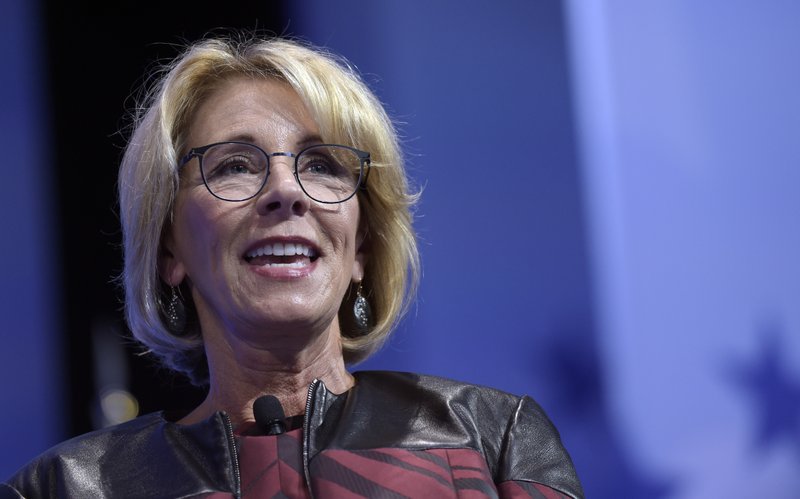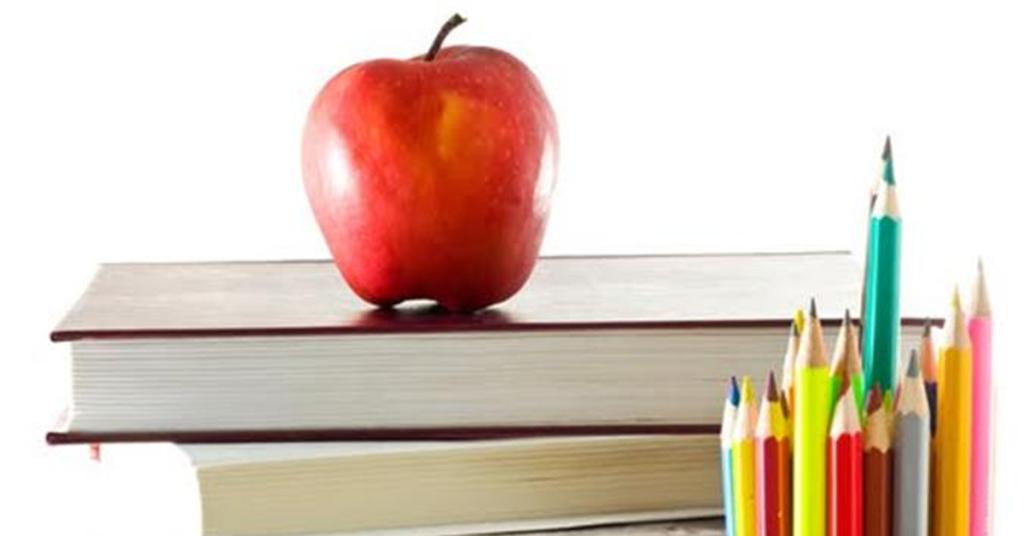Betsy DeVos touts school choice, STEM as education priorities

Education Secretary Betsy DeVos has put forth a new set of priorities for states, schools and universities competing for federal grant money. The priorities include school choice, science and technology, special education and school safety. The Education Department awards approximately $4 billion per year in new and continuation competitive grants across some 80 programs, the agency said Thursday. Education secretaries have historically used these competitions to push their priorities. “It’s a little nudge,” said Chad Aldeman, an associate partner at Bellwether Education Partners. “This allows the department to nudge the education field toward these priorities.” There are a total of 11 priorities on DeVos’ list. After receiving public comments on these proposals, the agency will settle on one or several of them. Promoting school choice has been a key focus of the Trump administration. School choice refers to providing parents and their children with options besides their district public school, such as charter schools, vouchers or education savings accounts to attend private schools. DeVos and her supporters say these options better serve students’ individual needs and can benefit children whose local schools are underperforming. Critics say charter and private schools don’t necessarily outperform neighborhood schools and they lack accountability mechanisms. Sen. Patty Murray of Washington, the top Democrat on the Senate committee devoted to education, criticized DeVos’ priorities as a way to privatize education and said the department should be focusing on supporting local, public education. “Since her confirmation hearing, I have voiced concern that Secretary DeVos would abuse her position to prioritize privatization, and that’s exactly what we’re seeing,” Murray said. “Instead of listening to the millions of students, parents and teachers who stood up against her extreme ideological agenda, her proposal will allow her to prioritize applicants that would siphon taxpayer funds away from the public schools that serve the vast majority of students.” Republished with permission from the Associated Press.
An array of different kinds of school voucher programs

More than half the country has a school choice program that enables families to use public money to send their children to private school. The programs vary by name, structure and eligibility requirements, but most are geared toward low-income families. In 2015, less than 1 percent of children in kindergarten through high school used vouchers to attend private schools. A look at some of the different types of school choice programs: — VOUCHERS State money in a per-student amount is reallocated and given to a chosen private school where the child is accepted. That money would have otherwise been given to the public neighborhood school that holds the responsibility to educate the student. The only federal voucher program is in the District of Columbia. — TAX-CREDIT SCHOLARSHIPS The programs generally allow private nonprofit groups to solicit taxpayers, primarily businesses, to contribute to their scholarship fund in exchange for state tax credits. The money is considered a charitable donation and the state deducts the amount, sometimes dollar-for-dollar, from the contributor’s tax bill. Families can then apply for a scholarship and the private nonprofits pay the private schools directly. States’ roles are deliberately limited to get around restrictions on using public money for private schools. — EDUCATION SAVINGS ACCOUNTS Public funds are placed in a government-administered “savings account” that families can use to pay for a wide range of education costs, from tuition and tutoring to transportation and textbooks. Republished with permission of The Associated Press.
Poll: Most unfamiliar with school choice but like the idea

Even as fierce political battles rage in Washington over school choice, most Americans know little about charter schools or private school voucher programs. Still, more Americans feel positively than negatively about expanding those programs, according to a new poll released Friday. “I wonder what the fuss is about,” said Beverly Brown, 61, a retired grocery store worker in central Alabama. Brown, who doesn’t have children, says American schools need reform, but she is not familiar with specific school options and policies. “Educational standards have to be improved overall.” All told, 58 percent of respondents say they know little or nothing at all about charter schools and 66 percent report the same about private school voucher programs, according to the poll conducted by The Associated Press-NORC Center for Public Affairs Research. Charters are schools funded by taxpayer money, but they operate independently of school districts and thus have more freedom in setting their curriculum and hiring staff. Vouchers are publically funded scholarships given to low-income families to help cover tuition in private schools, including religious ones. Using taxpayer money to aid struggling public schools or diverting it to fund more charter schools or make private schools available to more families has been hotly debated since Donald Trump was elected president. During the campaign, Trump promised to fund a $20 billion school choice program. He picked a long-time charter and private school advocate, Betsy DeVos, as his education secretary. Last week the president welcomed a group of students who were voucher recipients to the White House and asked Congress to work with him to make school options available nationwide. Those efforts face fierce resistance from Democrats and teachers unions, who say that school choice drains funds from public schools while leaving charter and private schools unaccountable in terms of academic standards and civil rights protections. Patrick McGuin, an education professor at Drew University, said he was surprised by the fact that most Americans had little knowledge about school choice options. “That’s pretty remarkable given the growth and high-profile politics around charters,” McGuin said. “As much as policymakers are talking the heck about this, the debate really hasn’t permeated the general public’s discussion yet.” Charter schools currently operate in 42 states and the District of Columbia. D.C. has only the federally funded voucher program, while 30 states have voucher or similar education choice programs. Even though they are unfamiliar to many, Americans have largely positive reactions to charter schools and vouchers. While 55 percent of respondents say parents in their communities had enough options with regard to schools, about 4 in 10 feel that that the country in general would benefit from more choice. Forty-seven percent say they favor opening more public charter schools, 23 percent are opposed, and 30 percent feel neutral about it. Meanwhile, 43 percent of respondents support giving low-income families tuition vouchers for private schools, 35 percent are opposed and 21 percent don’t have a strong opinion either way. Republicans are slightly more likely than Democrats to favor opening more charter schools, 53 percent to 42 percent, but there is little partisan variation for voucher programs. At the same time, opposition to vouchers is highest among those who have heard the most about them. John Rekers, a 46-year-old mortgage broker in California, has five kids and all of them are attending charter schools. He believes charter schools are more innovative and progressive. “They are not so oriented to sitting at desks and doing stuff,” he said. “The charter school is much better oriented in teaching children,” Rekers said. “They have higher standards.” Marc Culbreath, a janitor in Philadelphia, spent several years renting a house in the suburbs so that his children could go to quality public schools, but when the family moved into the city, they were appalled by neighborhood schools. “Kids in the city — their public schools are terrible,” Culbreath said. Culbreath sent his son, now in 10th grade, to a charter school and he is now on track to go to college. “They treat the kids in the city same as they treat the kids in the suburbs,” he said of the charter school. But Madolyn Stall, 22, a college student in Kansas, doesn’t support voucher programs. “If you cannot afford to go to a private school, then public school is fine,” she said. “I don’t really want to pay more of my tax money to send people to private school when they can go to public school.” About 7 in 10 respondents feel that both charter schools and private schools funded with taxpayer money should meet the same education standards as public schools. School choice critics point to the fact that most private school don’t need state accreditation to operate and that some private schools teach creationism in science classes. Still, Americans are more likely to say that private schools, both locally and nationally, provide a good quality of education than say the same of public schools. The AP-NORC poll of 1,036 adults was conducted April 20-23 using a sample drawn from NORC’s probability-based AmeriSpeak panel, which is designed to be representative of the U.S. population. The margin of sampling error for all respondents is plus or minus 4.0 percentage points. Respondents were first selected randomly using address-based sampling methods, and later interviewed online or by phone. Republished with permission of The Associated Press.


